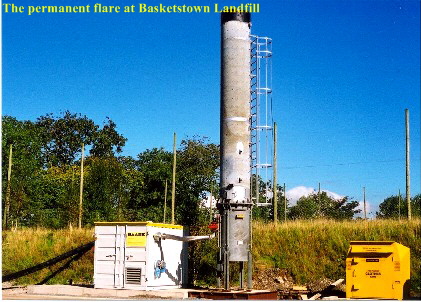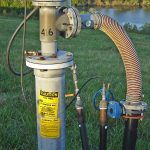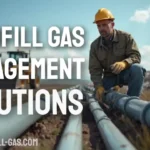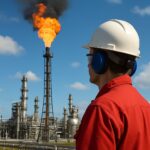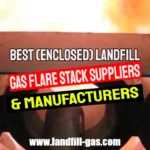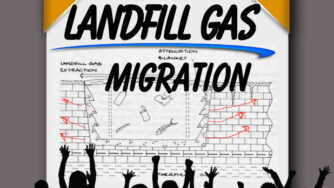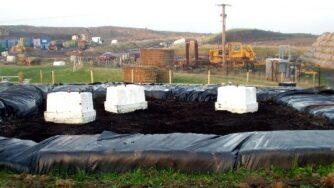 Read this first to find out about this website is about. Our aim is to provide those involved in the renewable energy, resource and waste management industries the best source of information about:
Read this first to find out about this website is about. Our aim is to provide those involved in the renewable energy, resource and waste management industries the best source of information about:
“Landfill gas, its creation and use, from the processes that produce it, to the production of sustainable renewable energy from it”.
We are United Kingdom based and as a result this website draws extensively on our UK landfill gas experience. However, the contents of this website should have global relevance. That's because landfill practice over the last 10 years has become more similar all around the globe.
What Do We Know About Landfill Gas?
Our UK experience dates back to the days of the very first contained (lined and capped) landfills, where modern landfill gas practices dating from the early 1980s were first applied, resulting in the first methanogenic landfills. In fact the onset of methane production came as something of a surprise in those early days, and as a result when there where several landfill gas accidents in the UK, injury and some deaths. More about that later, but I went on to be involved in many landfill gas recovery projects as part of my work as a landfill design engineer, working as the consultant engineer supervising the installation of many successful landfill gas collection and extraction systems.
What Part of this Website Did we Enjoy Writing the Most?
We have a section about landfill gas incidents which is unique! We enjoyed casting our mind back to the good old days! Landfill operators were being told to seal off the top of their landfills to reduce odour and leachate volumes, but for a while few thought about the danger off pushing landfill gas out sideways, beneath back gardens and into basements. The result was a few big bangs!
in particular, we discuss the high degree of public interest when a landfill gas explosion demolished a bungalow in Loscoe, Derbyshire, UK. That was when, for the first time certainly in the UK and almost certainly also worldwide, that both the possibilities and the hazards presented by landfill gas, were truly appreciated.
OK, that was the 1980s! What's Happening in Landfill Gas Now?
Fast forward to today, and throughout Europe the various Waste Regulations which originated from the EU landfill Directives has resulted in utilization of as much of the landfill gas as is practical from all landfill sites. That has resulted in a mature landfill gas extraction and Energy from Waste industry, variously called “EfW”, Waste to Energy “WtE”, and “biogas power” etc.
“Zero waste” to landfill is the big aim of many people, but while the importance of landfill may be waning in the industrialized nations, it is only just getting started for the citizens of the most populous nations.
Dislike it as almost everyone who lives near a landfill does, the peak use of sanitary landfill methods globally has yet to come. Many nations, which are enjoying growth and prosperity for the first time, are building ever larger landfills. Indeed even where high recycling rates are being achieved, many large landfill sites remain in use, and will still be needed and open for at least 10 to 15 years.
“The is a huge opportunity for big increases in landfill gas recovery rates throughout the US, the BRIC nations, and the new EU countries. That means business opportunities”…
For many growing industrializing economies, and for at least the next 10 years their landfill input rates will continue to grow. Even in the developed nations where the progressive reduction of Biological Municipal Waste (BMW) to landfill is in progress, waste inputs to landfill will not fall to below 50% of their peak inputs in the early 2000s within the next 5 years – despite the huge investment now being pumped into waste minimization, recycling and pre-treatment.
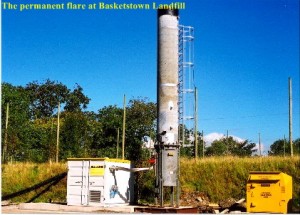 Even in the UK landfill gas energy production will continue to rise. 2011/12 has been the first year of circa 12% landfill waste input tonnage reduction, and this has been to a significant extent only due to the recession in the big waste generating industries such as construction. This fact can be deduced from a UK government report. Click here to view the Prime Minister's Office report (see page 3 of that report). Figure 2, below is reproduced from that report. The blue line shows an inexorable rise in UK MSW generated, while the pink line on the chart below (Fig 2.) represents the expected residual tonnage of MSW to be land filled each year.
Even in the UK landfill gas energy production will continue to rise. 2011/12 has been the first year of circa 12% landfill waste input tonnage reduction, and this has been to a significant extent only due to the recession in the big waste generating industries such as construction. This fact can be deduced from a UK government report. Click here to view the Prime Minister's Office report (see page 3 of that report). Figure 2, below is reproduced from that report. The blue line shows an inexorable rise in UK MSW generated, while the pink line on the chart below (Fig 2.) represents the expected residual tonnage of MSW to be land filled each year.
In many EU communities, with year on year increases in total waste tonnages still increasing by 2-3%, annual landfill input tonnages may actually continue to rise in the long term.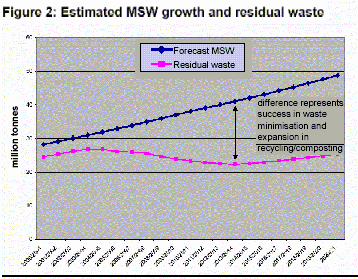
Right: Click on the image to view a larger version
Technical Challenges!
Challenges abound for the landfill gas industry, from optimizing yields and profits from LFG power generation with technologies such as cogeneration, to extending the techniques available to extract methane from lower quality and lower flow gas flow producing landfills with lower calorific value.
“This makes the landfill gas management industry a fascinating area to work and take an interest in”.
We also discuss the requirements to comply with new gas emissions and Clean Discharge Mechanism (CDM) requirements as landfill operators comply with national and international standards in the EU Landfill Directive, and Environmental Permitting to comply with the EU IPPC Regulations.
US Landfill Gas Resources: A Booming Green Energy Sector
Untapped U.S. Landfill Gas Resources are an Opportunity for Green Investment The American landfill gas (LFG) sector has seen a big change in recent years. It's now a key player in the country's biogas world. Even though it's only 23% of over 2,500 biogas systems now installed nationwide, it captures 72% of all biogas by […]
Landfill Gas Management Solutions
You know the tough part about landfill gas is that the problems rarely show up one at a time. Odors, off-site migration concerns, wellfield instability, and methane emissions can all trace back to the same root issue: gas is finding an easier path than the one you built for it. All this leads to the […]
Gas Flare Systems: Enhancing Safety and Efficiency in Landfill Gas Operations
Proper landfill gas flare systems can achieve up to 99.5% methane destruction efficiency, reducing environmental impacts. Enclosed systems enhance emission control. Safety features like flame arrestors prevent incidents. Flares integrate with energy recovery, transforming waste gases into renewable resources, offering compliance and sustainability benefits for landfill operations…
Best Enclosed Landfill Gas Flare Stack Suppliers & Manufacturers
Enclosed landfill gas flares are crucial for sustainable waste management, offering up to 99.9% methane destruction. Top suppliers like John Zink and Zeeco provide advanced systems with features minimizing emissions. Compliance is easier with these solutions, ensuring effective gas management and environmental protection…

